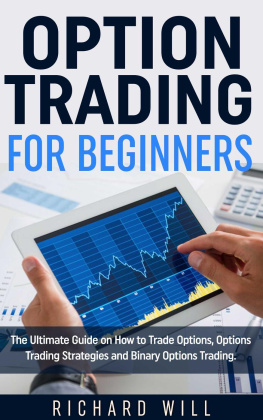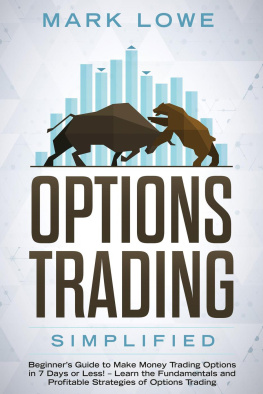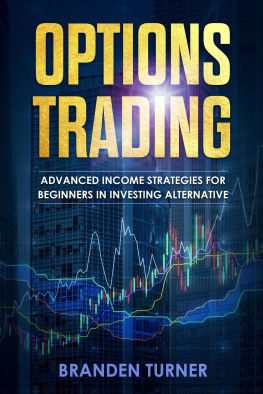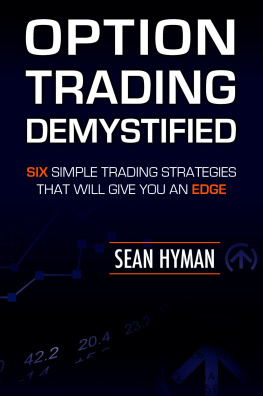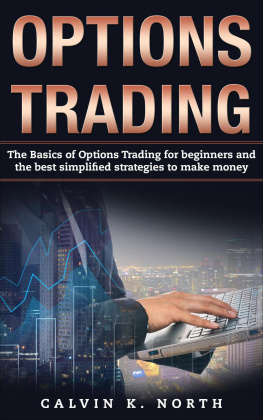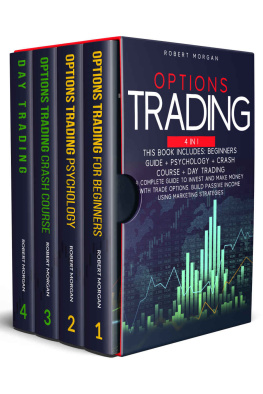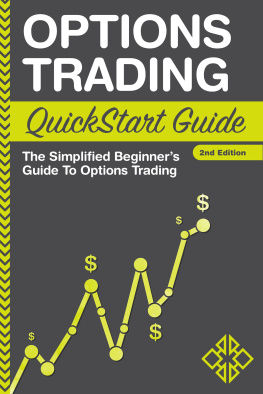Option Trading for Beginners
How to Trade Options, Options Trading Strategies and Binary Options Trading
Table of Contents
Introduction
L et me first start by congratulating you on purchasing this book Options Trading For Beginners: The Ultimate Guide on How to Trade Options, Options Trading Strategies and Binary Options Trading. Reading this book shows you've taken an important step in your journey towards success. Using the power of options is an excellent way for savvy investors to create wealth and set themselves up financially.
This book is aimed at people just starting out, who are looking to get a firm grasp on the basics, along with some sound trading advice and strategies on how to gain a competitive advantage. I'll discuss not only a couple good beginning options trading strategies but I'll also discuss binary options trading and some mistakes you'll want to avoid when first starting out.
Options trading is an exciting alternative for people looking at money making and investment opportunities. It doesn't require you have any prior experience in the field, and your risk is able to be negated since options are free of the obligatory aspects which are common in bonds and stocks.
This book is a straightforward take on options trading that will give you a good solid base of knowledge to get started from. I'll go over some of the strategies that are allowing other people just like you to earn a nice income through patience, observance and proper execution when trading.
Is this some type of get rich scheme. The answer is NO! Options trading involves risk. You need to be informed going in, and you need to learn how to identify trends in the market and capitalize on them.
I hope you take something from what I'm about to share with you in this book, and use it to create a positive change in your life.
Let's begin!
Chapter 1 - An Introduction to Options & Options Trading
I n this section, you will learn:
Option Terminology You Need To Know
What Is Options Trading?
Options Trading Basics
Options Terminology You Need To Know
T his book will be throwing a lot of different terminology you're way. To help you get familiar with the lingo, I've dedicated this beginning section to go over some of the common terminology you'll be seeing throughout the book. Much of this will be gone over in again later in the book, but I just want you to get briefly familiarized with the concepts before we begin in earnest. I would suggest visiting some trader sites and reading as much on the subject as possible. This will help you pick up the terminology, making the whole process smoother and less confusing.
Stock Option - This is a contract that is between two different parties, in which the holder (stock option buyer) purchases the right (yet isn't obligated) to sell / buy 100 shares of a particular underlying stock, which is set at a predetermined price to / from the writer (option seller) in a given fixed amount of time.
Option Types - There are two different stock option types. They are known as calls and puts. Put options give you the rights to sell underlying stock while call options allow a buyer the right to buy them.
Strike Price - This is the price where the underlying asset can be sold or bought when that option is exercised.
Premium - In order to get the rights that are conferred by an option, the holder (option buyer) has to pay out a premium to the option seller for carrying all the risk that is with the obligation. The premium will depend on a few different things, including the strike price, time left to expiration, and the underlying volatility.
Expiration Date - All options contracts are essentially just wasting assets, as options will eventually expire after a given time period. Once you have a stock option that expires, you no longer have a right to exercise and your option is worthless. The expiration date will be specified on every option contract. The date an option expires depends on what type of option it is. For example, United States stock options expire on the 3rd Friday of the stock options expiration month.
Option Style - Options are either European style or American style. The different styles have a few differences. The American options are allowed to be exercised at any point before the expiration date. The European options on the other hand can be exercised only on the actual expiration date. All the stock options that are currently being traded in our marketplaces happen to be American style.
Underlying Asset - This is the security that the writer (option seller) is obligated to deliver to or is obligated to purchase from the option holder if the option gets exercised. In regards to stock options, underlying assets will refer to shares of a particular company. Options are available for different types of securities also, like currencies, commodities and indices.
In The Money / Out Of The Money - This is trading speak for either bought a deficit/surplus or sold at a deficit/surplus. For example call options that are bought at a strike price that is below trading value is termed in the money. Put options that are purchased above it's actual price are also termed in the money. The reverse of both of these situations would be out of the money situations.
Contract Multiplier - This states the quantity of an underlying asset which needs to be delivered if an option is exercised. In regards to stock options, every contract will cover 100 shares.
The Options Market - People in this market both buy and sell call options and put options. Option sellers are referred to as writers. Option buyers are referred to as holders. Option holders are often said to have a long position, while Option writers are often said to have a short position.
What Is Options Trading?
T he section will break down an example of options trading to make it simpler to understand. Once you see how this type of trading is different from your traditional stocks and bonds, you'll see the earning potential for smart investors.
First off, what is an option? Well, in the section above we learned the definition of a stock option so let me give you an example to help clarify things further.
Say you had the opportunity to buy a parcel of land that normally would never be on the market, but you don't currently have enough funds to get it right then and there.
An option could let you buy the parcel at a locked in price of say $500,000, as long as you reserved your right to do so by buying an option of $5,000.
Once you purchased the option you lock in the agreed selling price for a predetermined amount of time so you're able to get the rest of the funds and finish the transaction.
This works out for you since you no longer need to worry about real estate values going up due to demand or someone else coming in and buying it out from under you. Your option works like a contract and protects your intent on eventually purchasing the property.
Now if for some reason you can't raise the funds needed to complete your transaction down the line or you found a better investment opportunity and don't want to use that money on the parcel of land, you can break your agreement. This will cost you the initial $5,000 you put down as well as a premium, which is basically a fee you pay for buying an option.
This will only end up occurring if you let your options deadline run out and expire without ever exercising your rights to sell off the option, albeit at different price than which it was initially purchased for. It's basically like an insurance policy that gives the person trading some type of protection against the contractual commitments.
Options trading covers a wide array of different areas not just real estate. Some other options available include things like orange juice, corn, steel and oil. This makes trading options one of the most interesting and versatile types of trading available.
Next page
